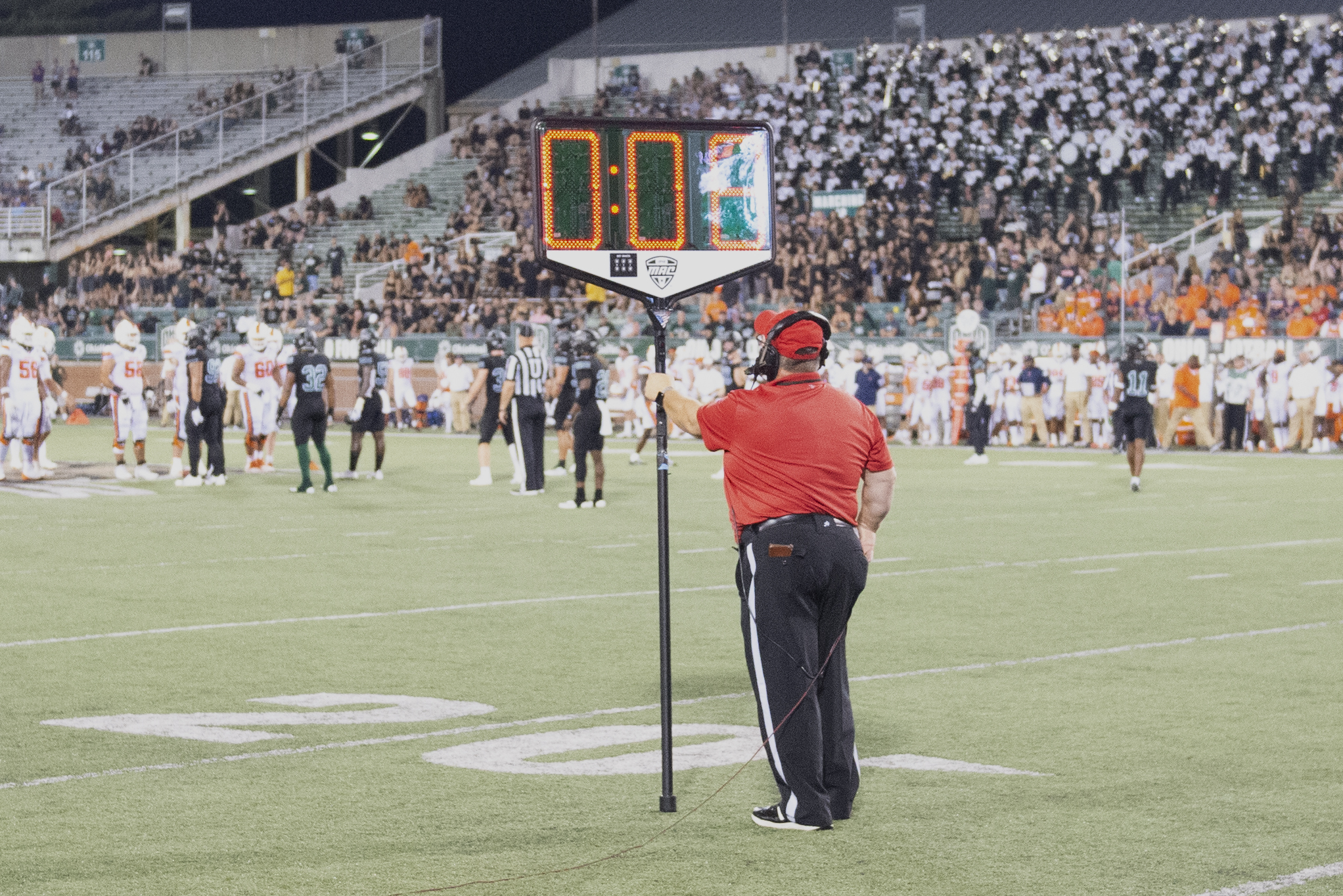Mississippi Today
Here’s what’s ruining college football, three minutes at a time

This may surprise you: On two of the past three weekends I have attended a high school game on Friday night and a college game on Saturday. And I am going to get right to the point.
The high school games were by far more enjoyable and entertaining.
Here’s why:
There were a certain continuity and flow to the Friday night games. There weren’t nearly as many stoppages. And the stoppages weren’t nearly as long.

The high school players weren’t as big or as gifted or as fast. But the games were better.
That’s because the college games kept being interrupted by these men wearing a red cap and carrying a stick with a clock on it. We’ll call them TV commercial enforcers, who would step out onto the field three or four times a quarter and essentially stop the game for three minutes that seemed more like 10. This happened so that TV could show several different commercials selling everything from cars, to beer, to soft drinks, to insurance. You name it.
Meanwhile, in the stands, people baked or broiled. Or, in my case, stewed.
The average Division I college football game lasts three hours, 22 minutes. Some stretch to four hours and longer. Meanwhile, Millsaps and Sewanee played a two-hour, 37-minute, 27-21 game last Saturday. The difference? No TV timeouts.
You don’t notice it so much when you are at home, watching on TV, and use the three minutes to go fix a snack, or go get another beer, or go use the restroom. You sure as heck notice it when the restrooms are 50 yards and long lines away and the beer costs $10.
And we wonder why there are huge gaps where people used to sit in the stands at stadiums these days. And we wonder why fans leave the stadium in droves beginning about halftime. We wonder why the student sections are often nearly empty in the fourth quarter. Boredom is a terrible thing.
Here’s the deal: In Division I college games these days, there are three TV timeouts in the first and third quarters, and four TV timeouts in the second and fourth quarters. They average about three minutes each. That’s an awful lot of dead time. These timeouts are known officially as “media timeouts.” Trust me, they are TV timeouts. Sports writers despise them.
This won’t change soon. In college football these days, it is all about feeding the beast, and all the beast will eat is money. In Mississippi, the head coach at Ole Miss makes $9 million a year, or approximately 74 times as much as the state’s governor. Heck, the defensive coordinator at Ole Miss makes 16 times the annual salary of the governor. (No jokes about which one is more drastically overpaid.)
And that’s just the start. There are 61 employees listed in the Ole Miss football directory. Besides the 10 full-time coaches allowed by the NCAA, there are a lead analyst, three senior analysts and six more analysts. That’s a lot of analyzing. The head football strength and conditioning coach has four full-time assistants.
There are recruiters, lots of them, and assistant recruiters. And no, I am not picking on Ole Miss. This is everywhere at college football’s top level. The Georgia football employee directory lists a “head performance chef.”
What’s more, these programs at college football’s highest level are in a never-ending facilities race. They are in a never-ending struggle to keep up with their conference mates.
And now we have name, image and likeness (NIL), which has raised the stakes still again. What used to be recruiting has become more like purchasing. College quarterbacks at the highest level have become millionaires. The left tackles who protect their blind side can’t be that far behind. Ohio State wide receiver Marvin Harrison Jr., quite possibly the best player in college football, reportedly makes $1.3 million for his various NIL deals in this, his junior season. Somebody’s got to pay.
That somebody is TV. The SEC distributed $50 million to each of its member schools for the 2021-22 fiscal year. Most of that is TV money, which is why the guy with the red hat and the clock takes the field for three minutes at a time, 14 times a game, while thousands in the stands twiddle their thumbs.
This is coming from a guy who has spent, quite literally, a lifetime going to the games – games that used to last little over two hours and now often stretch to nearly twice that long. Too long. Too much dead time.
This article first appeared on Mississippi Today and is republished here under a Creative Commons license.
Did you miss our previous article…
https://www.biloxinewsevents.com/?p=288986
Mississippi Today
Trump appoints former Gov. Phil Bryant to FEMA Review Council as state awaits ruling on tornadoes
President Donald Trump has appointed former Mississippi Gov. Phil Bryant to the FEMA Review Council, which Trump has tasked to “fix a terribly broken system” and shift disaster response and recovery from federal to state government.
The appointment comes as Mississippi awaits a response from the Trump administration on whether it will approve Gov. Tate Reeves’ request for a federal disaster declaration for deadly tornadoes in mid-March. The federal declaration, which Reeves requested April 1, would allow families and local governments devastated by the storms to receive federal assistance. Trump recently denied a similar request for Arkansas.
Trump has said states should shoulder more of the burden for disaster response and recovery, and he and Homeland Security Secretary Kristi Noem have threatened to shut down the Federal Emergency Management Agency altogether.
“I am proud to announce the formation of the FEMA Review Council, comprised of Top Experts in their fields, who are Highly Respected by their peers,” Trump wrote on social media. “… I know that the new Members will work hard to fix a terribly broken System, and return power to State Emergency Managers, who will help, MAKE AMERICA SAFE AGAIN.”
Trump listed other members of the council, including Secretary of Defense Pete Hegseth and Govs. Greg Abbott of Texas and Glenn Youngkin of Virginia.
Bryant, a longtime political ally of Trump, on social media wrote he is, “Honored to receive this appointment …” and that “Unfortunately, we’ve earned a lot of experience with natural disasters and recovery in Mississippi. Let’s Make America Safe Again.”
Mississippi saw seven deaths and an estimated $18 million in destruction from multiple tornadoes on March 14-15, the same storm system that caused damage in Arkansas. The Mississippi Emergency Management Agency reported that 233 homes were destroyed across 14 counties, and hundreds more were damaged.
During the initial aftermath, Reeves told reporters he believed there was a “high likelihood” the state’s damages from the March tornadoes would meet the threshold for FEMA’s Individual Assistance, which provides direct payments to disaster victims.
The Trump administration’s FEMA has denied federal assistance for flooding in West Virginia, tornadoes in Arkansas and a storm in Washington state, and refused North Carolina’s request for extending relief after Hurricane Helene.
After Hurricane Katrina’s devastation in 2005, Mississippi received nearly $25 billion in federal relief spending, which state leaders have credited with saving the state from ruin and allowing communities and families to rebuild.
This article first appeared on Mississippi Today and is republished here under a Creative Commons Attribution-NoDerivatives 4.0 International License.
Note: The following A.I. based commentary is not part of the original article, reproduced above, but is offered in the hopes that it will promote greater media literacy and critical thinking, by making any potential bias more visible to the reader –Staff Editor.
Political Bias Rating: Center-Right
The content presents a fairly neutral tone but leans towards a center-right perspective, particularly in its framing of President Trump’s actions and the appointment of former Mississippi Governor Phil Bryant. It highlights the argument for more state-level responsibility in disaster management, a position typically associated with conservative views. The reference to the Trump administration’s denial of federal assistance to certain states, including Arkansas, aligns with a more fiscally conservative stance that prioritizes reducing federal intervention. However, the mention of the substantial federal aid Mississippi received after Hurricane Katrina adds a historical balance to the perspective, indicating that the piece does not fully align with extreme conservative views.
Mississippi Today
Chris Lemonis fired, national search underway for Mississippi State baseball
Not quite four years after guiding Mississippi State to a baseball national championship, head coach Chis Lemonis has been fired, effective immediately.
Assistant coach Justin Parker will serve as interim head coach for the remainder of the season.
Mississippi State made the announcement in a press release Monday afternoon.
“A change in leadership is what is best for the future of Mississippi State baseball,” State athletic director Zac Selmon said. “We have not consistently met the standard of success that our university, fans and student-athletes expect and deserve. I want to thank Coach Lemonis for his work and the time he gave to our program, including a national championship in 2021. We appreciate his efforts and wish him and his family all the best moving forward.”
A national search is underway to identify the program’s next head coach, Selmon said.
“In a team meeting moments ago, I expressed to our student-athletes the confidence we have in their abilities and the potential they have for the remainder of the season,” Selmon said. “I encouraged them to compete with pride, resilience, and intensity. With the hard work, preparation, and talent already within this group, we are committed to putting them in the best position to finish the season competing at the highest level.
“Mississippi State is the premier job in college baseball. The tradition, the facilities, the NIL offerings and the fan base are all second to none. Dudy Noble Field is the best environment in the sport, period.”
The current Bulldogs have a 25-19 record and are 7-14 in the SEC. Most recently, the Bulldogs lost two of three weekend games to Auburn, the nation’s 11th-ranked team. State has lost its last two SEC series and five of seven this season. The Bulldogs are currently No. 45 in the nation in ratings percentage index (RPI) and are in danger of not making the NCAA Tournament for the third time in four years.
Lemonis’ MSU teams won 232 games and lost 135 in his six-plus seasons. Hired by former MSU baseball coach and athletic director John Cohen from Indiana, Lemonis has an overall coaching record of 373-226-2.
“This program is built for success,” Selmon said. “Our history proves it, and our future demands it. We are one of only four programs in NCAA history to reach the College World Series in six consecutive decades. With 40 NCAA Tournament appearances, 12 trips to Omaha, 11 SEC regular season titles, and a national championship, our program has always been a national contender. That is the bar. We’re going to find a leader who will embrace that, elevate our program and compete for championships.”
This article first appeared on Mississippi Today and is republished here under a Creative Commons Attribution-NoDerivatives 4.0 International License.
Note: The following A.I. based commentary is not part of the original article, reproduced above, but is offered in the hopes that it will promote greater media literacy and critical thinking, by making any potential bias more visible to the reader –Staff Editor.
Political Bias Rating: Centrist
The content provided is a straightforward news report about the firing of a baseball coach, Chis Lemonis, following his achievement of winning a national championship. The information is factual and does not indicate any political leaning, ideology, or bias. It is neutral in tone and intent.
Mississippi Today
MS House member agrees to pre-trial program after indictment
Rep. Keith Jackson, a Democratic lawmaker from Kemper County, can remain in office despite a felony indictment by participating in a pre-trial intervention program, according to court documents.
A grand jury last year indicted Jackson, a first-term House member, on charges of receiving stolen property – specifically, a 2006 Magnolia timber trailer worth about $15,000. The grand jury also indicted two other people, Fredwrick (sic) Young and William Tate, in connection with the criminal charges.
Jackson did not respond to a request for comment, and his attorney, Christopher Collins, declined to comment.
Cassie Colman, the district attorney in the 10th circuit district, told Mississippi Today that the state agreed to let Jackson participate in pretrial intervention because he had no prior criminal record. If Jackson completes the terms of the pre-trial agreement, then the criminal charges will be expunged from his record.
Going to trial would likely be risky for the lawmaker because, if convicted of the offense, he could lose the right to hold elected office.
Receiving stolen property is a disenfranchising crime in Mississippi, and if someone is convicted of a disenfranchising crime, they lose their right to vote. To run for office in Mississippi, someone must be a registered voter.
But Coleman, who prosecuted the case against Jackson, said the legislator’s agreement to enter the program is neither a guilty plea nor a conviction. Instead, he will enroll in the intervention program for at least a year and pay around $3,350 in fees, according to court documents.
If he fails to meet the terms of the agreement, the district attorney could remove him from the program and prosecute him for the original crime.
This article first appeared on Mississippi Today and is republished here under a Creative Commons Attribution-NoDerivatives 4.0 International License.
Note: The following A.I. based commentary is not part of the original article, reproduced above, but is offered in the hopes that it will promote greater media literacy and critical thinking, by making any potential bias more visible to the reader –Staff Editor.
Political Bias Rating: Centrist
The article presents factual information about a Mississippi House member’s legal situation, focusing on the details of the pre-trial intervention program and the potential consequences if he fails to meet the terms. There is no overt political commentary or slant, and it primarily reports on the legal process and actions taken by both the accused lawmaker and the prosecuting district attorney. The tone is neutral, and it avoids sensationalizing the case or making political judgments. Given the absence of opinion or partisanship, the content is categorized as centrist.
-

 SuperTalk FM6 days ago
SuperTalk FM6 days agoNew Amazon dock operations facility to bring 1,000 jobs to Marshall County
-

 News from the South - Missouri News Feed3 days ago
News from the South - Missouri News Feed3 days agoMissouri lawmakers on the cusp of legalizing housing discrimination
-

 News from the South - Florida News Feed7 days ago
News from the South - Florida News Feed7 days agoTrump touts manufacturing while undercutting state efforts to help factories
-

 News from the South - Florida News Feed7 days ago
News from the South - Florida News Feed7 days agoFederal report due on Lumbee Tribe of North Carolina’s path to recognition as a tribal nation
-

 News from the South - Oklahoma News Feed7 days ago
News from the South - Oklahoma News Feed7 days agoOklahoma Treasurer’s Office Faces Scrutiny Over Use of Signal in Anti-ESG Coordination
-

 Mississippi Today1 day ago
Mississippi Today1 day agoDerrick Simmons: Monday’s Confederate Memorial Day recognition is awful for Mississippians
-

 Mississippi Today5 days ago
Mississippi Today5 days agoStruggling water, sewer systems impose ‘astronomic’ rate hikes
-

 News from the South - Georgia News Feed6 days ago
News from the South - Georgia News Feed6 days agoOrganization files ethics complaint against Warnock | Georgia











































